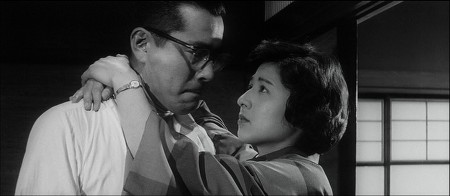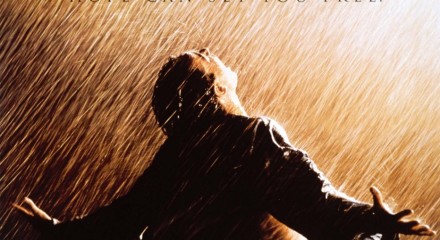
Image courtesy of japankino.de
“The Bad Sleep Well” (1960) has the components of a Filipino melodrama but with the extravagance of emotions whittled off. Japanese in its simplicity, it is nonetheless one of the Akira Kurosawa films that I most relate to because of a love story that infuses the themes of greed and corporate cronyism. Koichi Nishi (Toshiro Mifune) is a promising executive at a high-powered company run by a figurehead known only as Vice President Iwabuchi (Masayuki Mori). He has so won Iwabuchi’s favor that Iwabuchi welcomes him into the family as a son-in-law. Ambition is not Nishi’s motive, however. Unbeknownst to Iwabuchi, Nishi is the son of a former employee who jumped to his death from the window of the company headquarters. Corruption is rampant among the superiors, and rather than exposing deeds of crookedness, an employee… bound by loyalty… either is murdered or commits suicide. Nishi is on a mission to destroy Iwabuchi. His means of doing so is through the man’s daughter, Yoshiko (Kyoko Kagawa).

Image courtesy of wordpress.com
Yoshiko is a reticent woman, not because she is docile but because she is broken. A limp since birth has afforded her a life of loneliness, the only two people affectionate towards her being her father and brother, Tatsuo (Tatsuya Mihashi). The film begins with the wedding between her and Nishi, and we would think she would be smiling, happy at last; Nishi, with all his chicanery for deceit, must have fooled her into believing he loves her. Maybe he has, but that doesn’t stop the guests from gossiping about a possible ulterior motive. As Yoshiko overhears a guest comment, “Beautiful, until she walks.”
Those of us who are engrossed by a juicy romance could not ask for a better start. A handsome groom in the arms of a bride as luminescent as Venus yet as lugubrious as a weeping willow promises to tug at our heart strings. Kurosawa doesn’t stop with the teasing there. In their matrimonial chamber, Nishi rejects Yoshiko. He steps into an adjacent room, and as he shuts a screen that separates the two, she looks into the camera as if it were his eyes, her own eyes glazed with such need that it seems she is beseeching us to enter her life.
And we do. Kurosawa made “The Bad Sleep Well” as an indictment of power abuse and corporate crime. While all that is prime material for newspaper headlines, it’s the tension between Nishi and Yoshiko that serves as the movie’s magnet. It’s curious as to why Kurosawa made Yoshiko handicapped. Perhaps had she been flawless, she would have been a confident beauty with suitors by the hoard; hence, limiting Nishi’s chances as well as our sympathy. Instead, the director gives us a damsel onto whom we can project our own distress. Although I myself don’t have a physical deformity, I do have insecurities that can be crippling. They cut through two major elements of my existence: the creative and the romantic.

Image courtesy of photobucket.com
I have literary aspirations. Allow me to say first that I am thankful for the rejections to my writing I have received over the years. If success were to come easily, then I would never discover the assets that I bear with pride, that I am persevering, resilient, and passionate. Alison Lurie, a Pulitzer winning author who provided me with ample encouragement during my stint at the Cornell writing program, corroborated her support in an e-mail when I had moved back to San Francisco:
Please don’t give up. You are a gifted writer, and have important things to say. Remember that many, even famous writers, were rejected many times by stupid editors.
On the other hand, it’s been 15 years since I left Cornell. Granted I came out since then with a small novel, “Potato Queen,” which proved to be an enriching experience – talks in schools, reading tours, a contract with a book club – I have other manuscripts that I would like to share with the world.(http://www.rafsy.com/art-of-storytelling/the-reward-of-being-an-author-it-isnt-money/) It isn’t just on account of my own vanity that I desire recognition. People I love are also involved, those who have believed in me, who have given me the wealth of wisdom that has shaped me into the person I have become. Words are elemental to my identity. If rejections continue to prohibit me from declaring far and wide my tribute to those who have made me that which I am – a voice that can roar with the veracity of the best stories humankind has spun – then I ask what my purpose on earth is.

Image courtesy of a.ltrbxd.com
I ask where Akira Kurosawa himself got his sense of purpose, who were those that fueled his inspiration. He frequently referenced Shakespeare, but who else? What of his childhood? His personal conquests and defeats? Whatever the answers, the auteur knew the intricacies of love. We are all aware of how failure affects our self-perception in the dating pool. This is what makes Yoshiko a heroine. Comely as she is, she’s got a physical defect that everybody who surrounds her focuses on, and it renders her a disappointment… until Nishi comes along. The guy can’t help it. Hell bent he may be on hating Iwabuchi, the villain’s daughter is so alone yet self-pitiless, so vulnerable yet stoic, that he comes to see all that is gorgeous in her. When his cover is unmasked, Yoshiko puts her faith in him, the ills of her father too blatant to ignore. The result is a scene that in a Filipino movie would have been acted with maximum embellishment. Under Kurosawa’s vision, emotions have been buried for nearly two and a half hours beneath a heap of lies and revenge so that the tears and hugs are earned.
I have imagined love for me to happen as it does for Nishi and Yoshiko, two distant souls together at last in a union of thunder and lightning. In my daydreams, this would occur once I’ve earned a reputation as an author, for success would be my mating call. But this is not a healthy notion. It undermines the person I am, one who possesses the drive to parallel his aspirations, who can endear himself to an audience through the art of elocution, and a romantic who every now and then craves his fix of a bodice-ripping tearjerker. Until somebody does come along, though, films will have to suffice. This is what film is for, after all – to edify, to be sure, but also to console. Notice how the most compelling cinema involves love, even a story about a subject as dry as corporate corruption.

Image courtesy of wordpress.com
Trust Akira Kurosawa to develop “The Bad Sleep Well” into a heartfelt tale with a message that spans the ages: in a world damaged by evil, love is the one human element that redeems us.